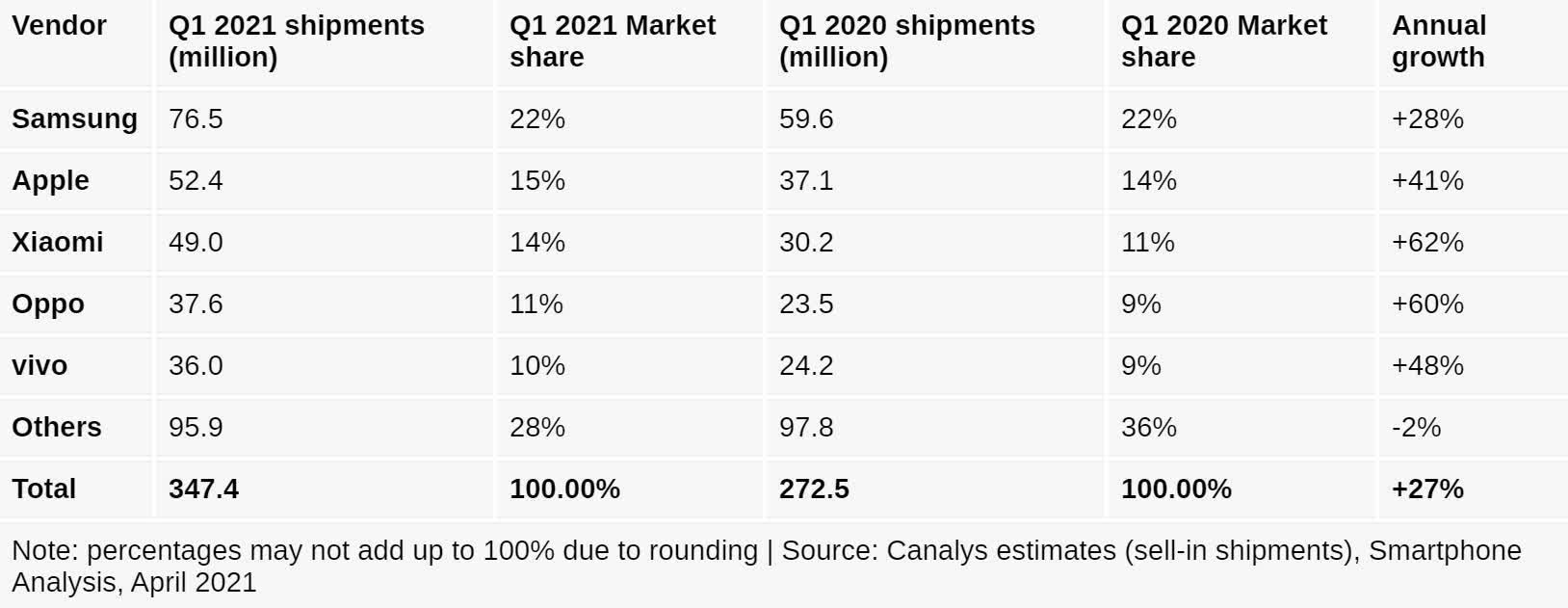[ad_1]
What just happened? Apple and Samsung are constantly battling for the title of ‘world’s largest smartphone maker.’ Cupertino had held the honor, but its rival is once again in the number one spot following a quarter that saw it account for over a fifth of all global phone shipments.
According to the latest report from analyst firm Canalys, over 347 million smartphones were shipped during the first quarter of the year. That’s a massive 27% increase compared to the same period in 2020.
Smartphone sales fell 20% during the height of the pandemic last summer, but the easing of lockdown restrictions, vaccine rollouts, and renewed demand has seen the industry rebound this year.
Samsung led the way with 76.5 million smartphones shipped between January-March, giving it a 22% market share. The company just revealed that its mobile segment’s profits were up 66% during the quarter, helped by strong sales of the Galaxy S21 line.
Apple, meanwhile, fell into second place after shipping 52.4 million iPhones and taking a 15% market share. The company made notable gains in China, where its revenue almost double to $17.7 billion during the first quarter.
“We’ve been especially pleased by the customer response in China to the iPhone 12 family,” said CEO Tim Cook. “You have to remember that China entered the shutdown phase earlier in Q2 of last year than other countries. And so they were relatively more affected in that quarter, and that has to be taken into account as you look at the results.”
Following Apple was Xiaomi, whose 49 million shipments marked a quarterly record for the firm. Oppo’s shipments grew 60% to 37.6 million, and Vivo saw 48% annual growth to hit 36 million.
Many of the companies benefitted from the declining fortunes of Huawei. Still suffering from US-imposed sanctions that prevent it from doing business with American firms, the Chinese giant saw its revenue shrink for a second quarter in a row in Q1 2021. It has now fallen to 7th on the list with 18.6 million units shipped.
While it was good news for the industry, we could soon feel the impact of the global chip shortage. “Supply of critical components, such as chipsets, has quickly become a major concern, and will hinder smartphone shipments in the coming quarters. And it will drive global brands to rethink regional strategies,” said Canalys Research Manager Ben Stanton.
“Some brands, for example, have de-prioritized device shipments in India, amid the new COVID-19 wave, and instead are focusing efforts on recovering regions, such as Europe. And while the shortages persist, it will grant larger companies a unique advantage, as the global brands have more power to negotiate allocation. This will put further pressure on smaller brands and could force many to follow LG out of the door.”
[ad_2]
Source link
